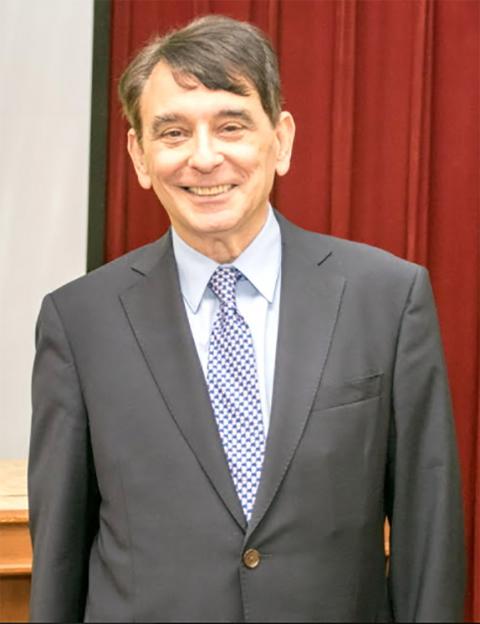The Taiwan Travel Act “atypically recognizes, albeit indirectly, that Taiwan is in fact a ‘country,’” former American Institute in Taiwan (AIT) director William Stanton wrote on Sunday.
“It is symbolically significant that [US] President [Donald] Trump has signed the Taiwan Travel Act rather than allowing it to go quietly into effect absent his positive endorsement,” wrote Stanton, a visiting professor at National Taiwan University’s International College.
Stanton described Trump’s signing on Friday of the Taiwan Travel Act as a “public signal of affirmation rather than private acquiescence.”

Photo courtesy of William Stanton
However, he also called Trump’s delay in signing the act “worrisome,” because he saw it as “another sign of the vacillation we have already witnessed in [Trump’s] policies toward China and Taiwan.”
Stanton said that during his time as AIT director, he “strongly and often advocated what the Taiwan Travel Act now calls for — expanded high-level visits and contacts” between Taiwan and the US.
“All of the restrictions on the conduct of [the US’] ‘non-
diplomatic’ relations with Taiwan were only the self-imposed interpretative creations of US government lawyers,” he wrote.
“There was no reason why we could not simply change them,” he said, adding that with “quiet support” from Washington, he raised the US flag over the AIT for the first time since 1979, when the US broke formal diplomatic ties with Taiwan.
“The Taiwan Travel Act is significant, not only because of the higher level treatment of Taiwan it calls for, but also for its ‘findings,’” Stanton wrote.
These findings include “recognition of Taiwan’s ‘momentous transition to democracy,’” and that Taiwan “serves as a ‘beacon of democracy in Asia,’” he said.
Stanton also highlighted the fifth finding stated by the US Congress in the Taiwan Travel Act: “Visits to a country by United States Cabinet members and other high-ranking officials are an indicator of the breadth and depth of ties between the United States and such country.”
He said he hopes Taiwan will take advantage of this “endorsement of higher-level contacts.”
He said he welcomes the “recent shift in direction of the Trump Administration in dealing with China, and the elevation of advisors in the White House who are more willing to challenge the traditional Kissingerian view that the apparent stability of the overall US bilateral relationship with China always supersedes all individual Chinese policies no matter how harmful they are to US interests.”
The Taiwan Travel Act is “an important milestone in the maturation of US policy toward Taiwan and China,” he added.
The next logical step for the US administration “should be abolishing the AIT Washington office,” he said.
The office “long ago ceased to have any real role in Taiwan’s relations with the United States which require no intermediaries,” he added.

Tropical Storm Gaemi strengthened into a typhoon at 2pm yesterday, and could make landfall in Yilan County tomorrow, the Central Weather Administration (CWA) said yesterday. The agency was scheduled to issue a sea warning at 11:30pm yesterday, and could issue a land warning later today. Gaemi was moving north-northwest at 4kph, carrying maximum sustained winds near its center of up to 118.8kph and gusts of 154.8kph. The circumference is forecast to reach eastern Taiwan tomorrow morning, with the center making landfall in Yilan County later that night before departing from the north coast, CWA weather forecaster Kuan Shin-ping (官欣平) said yesterday. Uncertainty remains and

SEA WARNING LIKELY: The storm, named Gaemi, could become a moderate typhoon on Wednesday or Thursday, with the Taipei City Government preparing for flooding A tropical depression east of the Philippines developed into a tropical storm named Gaemi at 2pm yesterday, and was moving toward eastern Taiwan, the Central Weather Administration (CWA) said. Gaemi could begin to affect Taiwan proper on Tuesday, lasting until Friday, and could develop into a moderate typhoon on Wednesday or Thursday, it said. A sea warning for Gaemi could be issued as early as Tuesday morning, it added. Gaemi, the third tropical storm in the Pacific Ocean this typhoon season, is projected to begin moving northwest today, and be closest to Taiwan on Wednesday or Thursday, the agency said. Today, there would likely

DISRUPTIONS: The high-speed rail is to operate as normal, while several airlines either canceled flights or announced early departures or late arrivals Schools and offices in 15 cities and counties are to be closed today due to Typhoon Gaemi, local governments announced last night. The 15 are: Taipei, New Taipei City, Taoyuan, Tainan, Keelung, Hsinchu and Kaohsiung, as well as Yilan, Hualien, Hsinchu, Miaoli, Chiayi, Pingtung, Penghu and Lienchiang counties. People should brace for torrential rainfall brought by the storm, with its center forecast to make landfall on the east coast between tonight and tomorrow morning, the Central Weather Administration (CWA) said. The agency issued a sea warning for the typhoon at 11:30pm on Monday, followed by a land warning at 11:30am yesterday. As of

CASUALTY: A 70-year-old woman was killed by a falling tree in Kaohsiung as the premier warned all government agencies to remain on high alert for the next 24 hours Schools and offices nationwide are to be closed for a second day today as Typhoon Gaemi crosses over the nation, bringing torrential rain and whipping winds. Gaemi was forecast to make landfall late last night. From Tuesday night, its outer band brought substantial rainfall and strong winds to the nation. As of 6:15pm last night, the typhoon’s center was 20km southeast of Hualien County, Central Weather Administration (CWA) data showed. It was moving at 19kph and had a radius of 250km. As of 3pm yesterday, one woman had died, while 58 people were injured, the Central Emergency Operation Center said. The 70-year-old